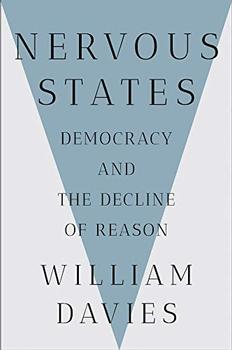
Democracy and the Decline of Reason
by William Davies
In this age of intense political conflict, we sense objective fact is growing less important. Experts are attacked as partisan, statistics and scientific findings are decried as propaganda, and public debate devolves into personal assaults. How did we get here, and what can we do about it?
In this sweeping and provocative work, political economist William Davies draws on a four-hundred-year history of ideas to reframe our understanding of the contemporary world. He argues that global trends decades and even centuries in the making have reduced a world of logic and fact into one driven by emotions - particularly fear and anxiety. This has ushered in an age of "nervous states," both in our individual bodies and our body politic.
Eloquently tracing the history of accounting, statistics, science, and human anatomy from the Enlightenment to the present, Davies shows how we invented expertise in the seventeenth century to calm the violent disputes - over God and the nature of reality - that ravaged Europe. By separating truth from emotion, scientific, testable facts paved a way out of constant warfare and established a basis for consensus, which became the bedrock of modern politics, business, and democracy.
Informed by research on psychology and economics, Davies reveals how widespread feelings of fear, vulnerability, physical and psychological pain, and growing inequality reshaped our politics, upending these centuries-old ideals of how we understand the world and organize society. Yet Davies suggests that the rise of emotion may open new possibilities for confronting humanity's greatest challenges. Ambitious and compelling, Nervous States is a perceptive and enduring account of our turbulent times.
"Starred Review. A fresh, astute examination of current events and urgent challenges." - Kirkus
"Intricately but not tightly argued, Davies's book shoehorns everything from the opioid epidemic to transhumanism into his analysis, which will appeal most to those concerned about technology, put off by claims of objectivity, and interested in insights about the role of emotion in politics." - Publishers Weekly
"Academic, though accessible and of interest to all readers given the range of topics." - Library Journal
"[A]n absorbing book fizzing with ideas… Davies is a wonderfully alert and nimble guide and his absorbing and edgy book will help us feel our way to a better future." - The Guardian (UK)
"A call for action." - Evening Standard (UK)
"Engrossing…Davies is a lively writer." - Literary Review (UK)
"Sits at the intersection of ongoing debates about post-truth, the assault on reason, the privileging of personal feelings and the rise of populism…[Davies] makes a compelling case for paying more attention to the role of feelings, alongside that of reason, in modern life."- Financial Times (UK)
"An insightful and well-written book that explores the deep roots of the current crisis of expertise. The scientific community has been founded on the basis of separating reason from feeling. But now science itself has exposed this separation as an untenable myth. So where do we go from here?" - Yuval Noah Harari, New York Times best-selling author of Sapiens
"William Davies brilliantly explains that we can no longer sensibly look for hope in ever more technological achievements, especially those that subjugate nature to our will. As our times slow down we must confront our fears, our pain and our resentment. We have to redefine hope." - Danny Dorling, Halford Mackinder Professor of Geography at Oxford University and author of A Better Politics
This information about Nervous States was first featured
in "The BookBrowse Review" - BookBrowse's membership magazine, and in our weekly "Publishing This Week" newsletter. Publication information is for the USA, and (unless stated otherwise) represents the first print edition. The reviews are necessarily limited to those that were available to us ahead of publication. If you are the publisher or author and feel that they do not properly reflect the range of media opinion now available, send us a message with the mainstream reviews that you would like to see added.
Any "Author Information" displayed below reflects the author's biography at the time this particular book was published.
William Davies is a political economist at Goldsmiths, University of London, the author of Nervous States and The Happiness Industry, among other books, and a contributor to publications including the Atlantic and the New York Times. He lives in London.




They say that in the end truth will triumph, but it's a lie.
Click Here to find out who said this, as well as discovering other famous literary quotes!
Your guide toexceptional books
BookBrowse seeks out and recommends the best in contemporary fiction and nonfiction—books that not only engage and entertain but also deepen our understanding of ourselves and the world around us.